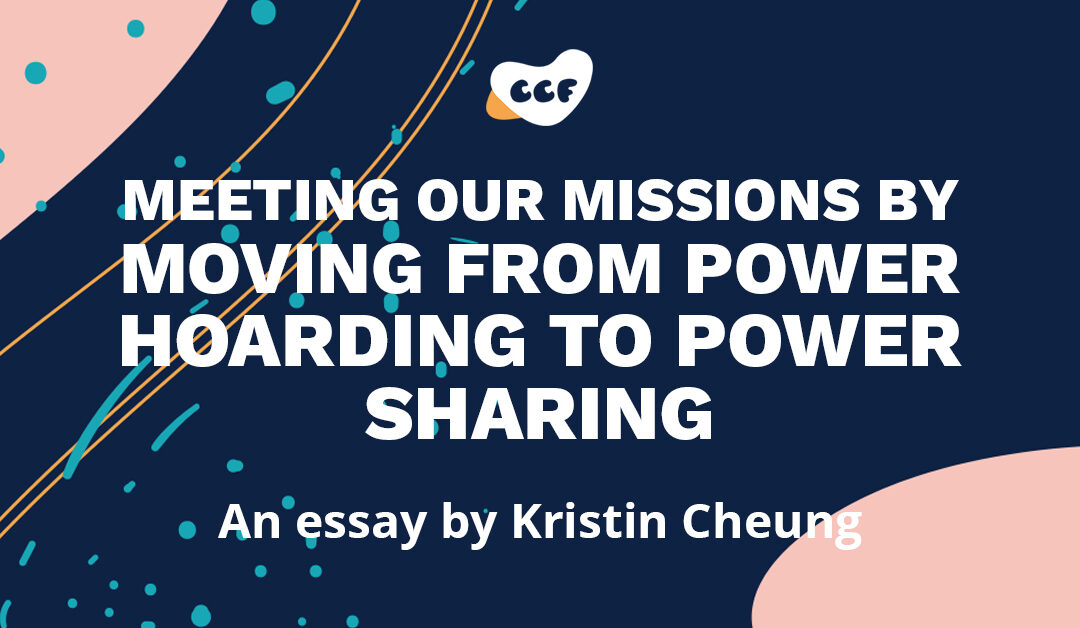By Kristin Cheung, arts administrator, executive director, and co-founder of Future Arts Network
One way organizations can grow their audience base (and equity in the field) is to share their power and connect with smaller groups such as unincorporated groups, collectives, and grassroots groups.
For the first 15 years I’ve spent working in arts nonprofits, I’ve worked with different types of leaders, and now that I’m in a leadership position myself, I want to use this position of power to be part of systems change work. In the past two years as an Executive Director, I’ve worked to build an organization with transparency and clear communication, and one that strives to be equitable.
To build an equitable organization, we must first face the reality that there are many traits in a traditional nonprofit work environment that are actually characteristics of white supremacy culture. Characteristics like: Perfectionism, Sense of Urgency, Quantity over Quality, Either/Or Thinking, Power Hoarding, and Individualism.
For this article, I want to expand on how I worked to combat Power Hoarding by sharing my non-profit’s charity status and institutional power to support smaller grassroots groups and collectives.
The traditional thinking that leads to Power Hoarding
The traditional thinking for many long-term institutions is that power is limited, with only so much to go around. Many institutions and their leaders feel threatened if others suggest changes or criticisms. Many institutions have leaders who hold and control much of the information within the organization without sharing it widely – this builds an environment with a lack of transparency and distrust in the organization.
Instead of power hoarding, we should seek to “power share” across the aspects of organizations.
First, we must understand there is power and privilege involved in holding non-profit and charitable status. With these designations, you can access funding, resources, and, for some people, credibility.
Under the status quo, these institutions keep their power status by applying for funding to hire staff, and the staff grows the budget, program, and audience numbers. But overall, the organization does not share their resources or knowledge of them widely, except for the annual general meeting where they’re legally required to share their financial statements and “impact reporting” to the community.
Meeting our mission through Power Sharing
One way organizations can grow their audience base (and equity in the field) is to share their power and connect with smaller groups such as unincorporated groups, collectives, and grassroots groups. These larger institutions should be able to develop meaningful partnerships with these groups and use their charitable status to apply for more funding with the smaller groups and connect them with more resources such as funding, staffing, meeting rooms, donors, and so on.
Here in Canada, institutional funders are slowly shifting to allow these nonprofits to support smaller groups. I work in Vancouver and the City of Vancouver’s Cultural Services Department has opened up funding so non-profit organizations can sponsor applications for collectives or individuals. This means a larger institution can sponsor a smaller grassroots group (that does not have non-profit status) and apply for funding.
The City of Vancouver has several arts and culture grants and one of them is the “Communities and Artists Shifting Culture (CASC) Grant,” this grant has the option to support “sponsored application for individual artist or collective.” From the granting application guide, “Groups and individuals from equity-deserving communities that are not incorporated as registered non-profits, co-ops, or charities may submit an application via a sponsor organization that is a registered non-profit society, co-op, charity or First Nations Band council. The sponsor organization must have a mandate to serve the same equity-deserving community(ies) as the group or individual.”
In the past few years, the CASC grant has had an increased number of successful sponsored applications. In April 2022, sponsored applications were 12% of successful applications, and in 2023, sponsored applications were 25% of the successful applications. More smaller groups are applying for grants through registered non-profit societies that serve the same equity-deserving communities!
Another path of sharing power is through changes at the Canadian federal government level. Senators are creating paths to shift the way charities and non-charities are able to have more meaningful collaborations.
In March 2021, Independent Senator Ratna Omidvar said, “The Income Tax Act is perpetuating systemic racism and colonialism in Canada in how it deals with charitable organizations.” She has since raised the issue, made reports, and introduced a new private member’s bill to help change the system. The overall goal is to build a more equitable system for all groups – including marginalized communities – who rely on charitable donations.
In November 2021, Senator Ratna Omidvar introduced Bill S-216, “The Effective and Accountable Charities Act,” which will amend the Income Tax Act to enable charities to establish equal partnerships with non-charities, empowering the voices of BIPOC organizations and ensuring accountability and transparency. Overall, the bill aims “to eliminate the deeply-rooted and historic paternalism that many see embedded in the current rules about how charities can operate.” The bill still needs to be passed by both Chambers and will take a few years to receive royal assent. But overall this is a positive step in the right direction to empower the voices of BIPOC organizations while ensuring accountability and transparency.
In my work, running a non-profit charitable arts organization, I have worked with several grassroots community groups and collectives and in the past 12 months sponsoring their applications and we’ve been successful in receiving over $110,000. I also use my knowledge as a grant writer to mentor and support other individuals and artist’s grant applications. In the past few years they’ve been successful in receiving over $229,000 in funding. By using our positions of powers, we can share power and knowledge to support the wider community beyond our own.

Kristin Cheung
Kristin Cheung | 冮雪莉 (she/her) is an executive director, arts administrator, and cofounder of Future Arts Network. She is currently residing on the traditional territories of the Semiahmoo, Katzie, Kwikwetlem, Kwantlen, Qayqayt, and Tsawwassen First Nations.
She is passionate about working with and supporting the work of underrepresented communities and has co-founded Future Arts Network, a free community mentorship program for young women of colour and marginalized genders in the arts. This intersectional feminist program aims to build a future with strong, diverse women in leadership positions, reflective of the current cultural landscape. Kristin has a Masters in Arts Administration & Cultural Policy from Goldsmiths University of London. She can be reached at @cheung_kristin on X (formerly Twitter) and Instagram. To send her a tip for this essay, PayPal her at @kristincheung.
Discover more from CCF
Subscribe to get the latest posts sent to your email.

